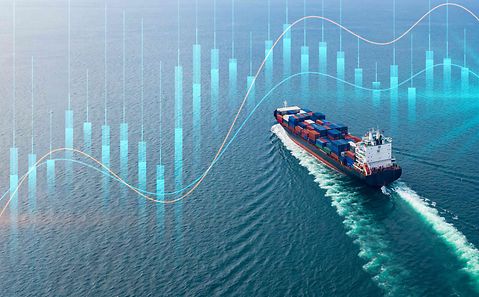
SAP Data Intelligence in Logistics
Logistics planning in a complex world
Effective logistics are vital to today’s fast-moving and fluid business world. From the need to maximize efficiency and minimize stress in supply-chains, to the ever-increasing customer expectations for rapid, assured last-mile delivery, logistics planning and execution have never been more important.
Logistics planning is driven by a wide range of factors, many of which are beyond the direct control of the logistics agent. The effects of the Covid pandemic and geopolitical upheavals are placing unprecedented pressures on supply chains, as highlighted by a 2022 KPMG report.
Planning increasingly depends on the ability to gather data in real time from a broad and diverse set of data points, applying intelligent analytics to turn it into actionable insights that are fed back directly into planning and execution.
This blog explores how SAP Data Intelligence can deliver this capability to transform logistics planning and execution.
What Is SAP Data Intelligence?
SAP Data Intelligence is a comprehensive data management solution that enables the enterprise to manage, orchestrate, integrate, and process massive volumes of diverse data within a single solution. It transforms distributed data sprawls into vital business insights to drive improved decision-making and operational agility, providing a single enterprise data source that can be accessed anytime, anywhere.
As the data orchestration layer of the SAP Business Technology Platform (SAP BTP), it integrates seamlessly with the analytics capabilities of SAP Analytics Cloud (SAC), the data warehousing functions of SAP Datasphere, and SAP Business Warehouse (BW), to provide the rich, data-led, intelligent, agile planning and operations functionality that today’s business environment demands.
Large volumes of structured as well as unstructured data, current and historical, across multiple heterogeneous sources and data streams, are orchestrated, simplified, explored, and exposed as the foundation for designing machine learning (ML) models that are deployed to automate and optimize planning and operational processes. This scalable, repeatable, production-ready ML pipeline, supporting latest ML Ops processes, enables companies to develop intelligent processes driven by real-time data insights.
How SAP Data Intelligence Can Transform Logistics Planning
The logistics function has traditionally been regarded as particularly sensitive to unforeseeable external factors. A 2022 UK article for the pallet industry points out how “unpredictable situations arise all the time causing the logistics team to go through a lot of trouble to find solutions to various problems they have no control over and that tend to come with all kinds of excuses such as bad road conditions, technical problems, family emergencies or the driver's lack of experience, among others.”
Customers and supply chain partners become frustrated when they perceive that these external factors are being used as an excuse for logistics performance shortfalls. For example, ‘unavoidable’ delays due to bad weather may provoke responses along the lines of “Couldn’t they have predicted it would snow in January, in Europe?”
When we talk about unforeseeable external factors in logistics, we are generally referring to data that could be captured, analyzed, modelled, and considered in logistics planning, given the right access, data management, analytics and planning systems capabilities.
Using, e.g., Google Maps to work out the quickest route right now for a delivery is a small step forward, but it is a manual process that only uses a tiny part of the potential of the huge range of data sources and analytics capabilities that exist now.
SAP Data Intelligence, with SAP SAC, BW and Datasphere, enables the multitude of heterogenous factors that can impact logistics to be organized into data streams, orchestrated, analyzed, modelled, and plugged back into intelligent, ML-based planning in real-time.
To take a single potential use case, it enables optimization of delivery schedules and routes for multiple customers on the day using ML-based models that have a comprehensive view of historical and current data on road conditions, weather, staffing levels, system loads and all the other factors that can impact delivery.
What Next?
SAP announced in 2022 that it will bundle its portfolio elements in the area of analytics in order to maximize the benefits for customers and to be able to grant a high level of interoperability. In the future, SAP Data Intelligence will be transferred and integrated into the SAP Datasphere.
Written by



